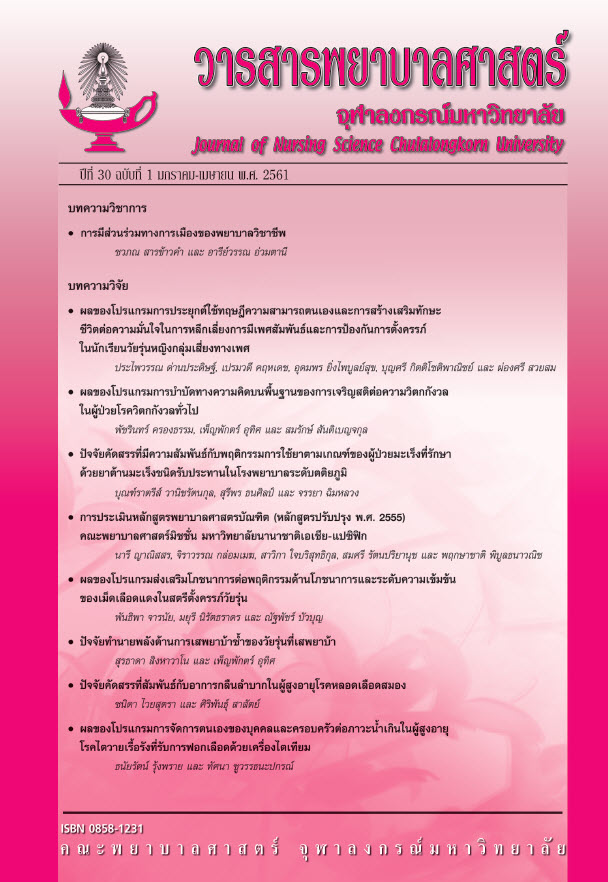ปัจจัยคัดสรรที่มีความสัมพันธ์กับพฤติกรรมการใช้ยาตามเกณฑ์ ของผู้ป่วยมะเร็งที่รักษาด้วยยาต้านมะเร็งชนิดรับประทาน ในโรงพยาบาลระดับตติยภูมิ
คำสำคัญ:
พฤติกรรมการใช้ยา;ยาต้านมะเร็งชนิดรับประทาน;ผู้ป่วยมะเร็งบทคัดย่อ
วัตถุประสงค์ : ศึกษาความสัมพันธ์ระหว่างปัจจัยคัดสรรกับพฤติกรรมการใช้ยาตามเกณฑ์ของผู้ป่วยมะเร็ง ที่รักษาด้วยยาต้านมะเร็งชนิดรับประทาน
รูปแบบการวิจัย : การวิจัยแบบบรรยายเชิงความสัมพันธ์
วิธีดำเนินการวิจัย : กลุ่มตัวอย่างคือผู้ป่วยที่ได้รับการวินิจฉัยเป็นโรคมะเร็งระยะเริ่มต้นจนถึงระยะลุกลาม และรักษาด้วยยาต้านมะเร็งชนิดรับประทาน ในโรงพยาบาลระดับตติยภูมิ 3 แห่ง จำนวน 121 คน คัดเลือก ด้วยวิธีการสุ่มหลายขั้นตอน รวบรวมข้อมูลด้วยแบบสอบถามข้อมูลส่วนบุคคล การเจ็บป่วย แรงสนับสนุน ทางสังคมจากครอบครัว การรับรู้ความรุนแรงของอาการและของโรคมะเร็ง การรับรู้ประโยชน์ของการรักษา ความเชื่อเกี่ยวกับความจำเป็นต่อการกินยาและความกังวลต่อการกินยา และพฤติกรรมการใช้ยาตามเกณฑ์ ซึ่งมีความตรงตามเนื้อหา มีค่าสัมประสิทธิ์แอลฟ่าครอนบาค เท่ากับ .94, .92, .89, .89, .89, .77 และ .82 ตามลำดับ วิเคราะห์ข้อมูลโดยสถิติสหสัมพันธ์เพียร์สัน
ผลการวิจัย: ค่าเฉลี่ยของพฤติกรรมการใช้ยาตามเกณฑ์ของผู้ป่วยมะเร็งที่รักษาด้วยยาต้านมะเร็งชนิด รับประทานอยู่ในระดับที่ดี ( = 4.50, SD = 0.36) แรงสนับสนุนทางสังคมจากครอบครัว และความเชื่อ เกี่ยวกับความจำเป็นต่อการกินยามีความสัมพันธ์ทางบวก และความเชื่อเกี่ยวกับความกังวลต่อการกินยา มีความสัมพันธ์ทางลบกับพฤติกรรมการใช้ยาตามเกณฑ์ (r = .40, p < .05, r = .24, p < .05 และ r = -.24, p < .05 ตามลำดับ)



